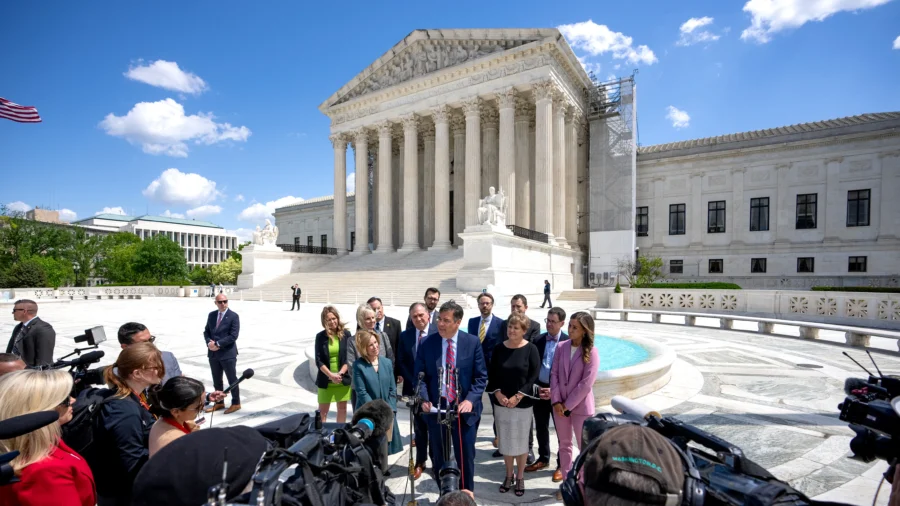Most Supreme Court justices seemed inclined to accept Idaho’s argument on April 24 that the state’s strict abortion law does not conflict with a federal law that prevents hospitals from refusing to treat indigent emergency room patients.
At the same time, liberal justices vigorously questioned whether the Idaho law is putting women in danger.
The court heard oral arguments in Moyle v. United States, which has been consolidated with Idaho v. United States. Lead applicant-petitioner Mike Moyle is the Republican speaker of Idaho’s House of Representatives. The conservative Alliance Defending Freedom is on Idaho’s legal team.
The case is about whether a state law that restricts abortion conflicts with a federal law that forbids “patient dumping,” the practice of hospitals refusing emergency treatment to people who can’t afford to pay for medical services.
The Biden administration says the state law runs afoul of the federal law, which requires that emergency room patients be provided stabilizing care. The administration also says that state abortion restrictions such as Idaho’s have confused patients and health care professionals and delayed critical care for pregnant women.
At the same time, Idaho argues that federal law and the state law are not in conflict. Idaho says the federal government is trying to stretch the reach of the federal law to override the state’s abortion law, as part of an effort to create a federal right to abortion.
The Idaho case goes back to 2020, when the state enacted the Defense of Life Act with a built-in triggering provision, allowing it to take effect if Roe v. Wade (1973) were ever overturned. The law took effect in 2022 after the Supreme Court ruled in Dobbs v. Jackson Women’s Health Organization. That decision, which reversed Roe v. Wade, found the U.S. Constitution does not protect a right to abortion and returned its regulation to the states.
Idaho’s Defense of Life Act forbids abortions except when “necessary to prevent the death of the pregnant woman” or during the first trimester when the pregnancy was a result of rape or incest.
After the state law took effect, the Biden administration committed itself to undermining Dobbs and weakening state laws that restrict abortion, critics say.
The Emergency Medical Treatment and Labor Act (EMTALA) was passed by Congress in 1986 “to ensure public access to emergency services regardless of ability to pay,” according to a Centers for Medicare and Medicaid Services summary.
The Biden administration takes the position that Idaho’s Defense of Life Act is preempted by EMTALA, which requires hospitals that receive Medicare funding to provide stabilizing treatment for emergency patients, and that such treatment includes abortions. Federal preemption means that a state law that conflicts with federal law is invalid.
U.S. District Judge Lynn Winmill, appointed by President Bill Clinton, ruled in August 2022 that the Idaho law partly conflicts with EMTALA. The judge restrained Idaho from enforcing its state law “as applied to medical care required by” EMTALA.
In September 2023, a three-judge panel of the U.S. Court of Appeals for the Ninth Circuit reversed the Idaho District Court’s decision, finding that EMTALA and the state statute did not conflict, but two months later, the court reinstated the District Court’s injunction.
The full circuit was preparing to hear the case, but on Jan. 5, the Supreme Court granted Idaho’s request to lift the injunction, pending the outcome of the case at the high court.
During oral arguments on April 24, Idaho Deputy Solicitor General Joshua N. Turner said EMTALA and the Idaho statute do not conflict.
“And nothing in EMTALA requires doctors to ignore the scope of their license and offer medical treatments that violate state law,” he said.
The administration’s misreading of EMTALA “lacks any limiting principle,” the attorney said.
“If ER doctors can perform whatever treatment they determine is appropriate, then doctors can ignore not only state abortion laws, but also state regulations on opioid use and informed consent requirements.”
Justice Elena Kagan asked what would happen if a state modified its abortion laws to prevent the treatment of ectopic pregnancies, in which a fetus begins growing outside the uterus.
In such a situation, the federal government should not intervene, Mr. Turner said.
“That understanding is a humble one with respect to the federalism role of the states,” he said.
Justice Kagan replied, “It may be too humble for women’s health.”
Justice Neil Gorsuch asked Mr. Turner to explain how close to death a patient needs to be under the state law for an abortion to be allowed. The justice also cited ectopic pregnancies, which can be life-threatening, but not always immediately.
“It doesn’t matter whether it happens tomorrow or next week or a month from now?” the justice said.
“There is no imminence requirement,” Mr. Turner replied. “This whole notion of delayed care is just not consistent with the Idaho Supreme Court’s reading of the statute and what the statute says.”
U.S. Solicitor General Elizabeth Prelogar said the situation “on the ground in Idaho is devastating.”
Because Idaho’s law makes an unauthorized abortion a felony, a woman experiencing medical problems who is not in danger of dying may not be given an abortion, she said.
Doctors must decide to delay treatment or ship the patient out of state, which endangers patients, Ms. Prelogar said.
The Idaho case comes as the Supreme Court deliberates another abortion-related appeal, Food and Drug Administration v. Alliance for Hippocratic Medicine, which the court heard on March 26. A doctors’ group sued the Food and Drug Administration for loosening regulations pertaining to the abortion pill mifepristone, claiming the relaxation of the rules violates federal law.
Advocates for mifepristone say the current system for dispensing the drug is safe, while opponents say it puts women at risk by ignoring safety measures that used to be in place.
The Supreme Court is expected to rule on the mifepristone case and the Idaho case by the end of June.
From The Epoch Times


